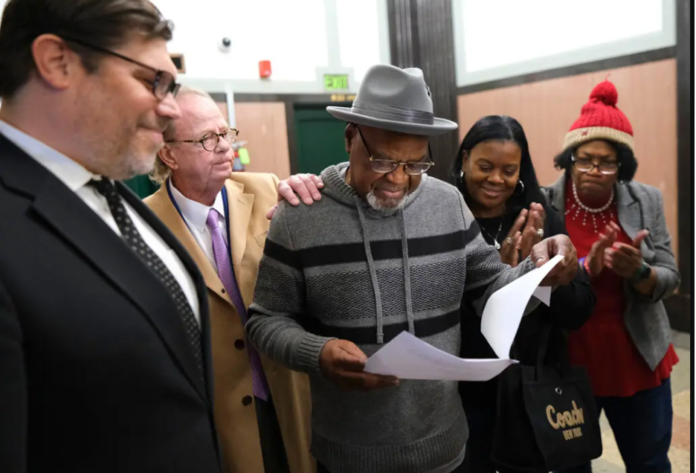A Black man in the United States has been freed from prison after spending nearly 50 years behind bars for a crime he did not commit but was made to pay for in a judicial system laced with racism.
Glynn Simmons was 22 at the time of his jailing in 1975 and is now 70 having spent time in prison longer than anyone else cleared of charges.
The case bolsters the argument against capital punishment because Simmons was originally sentenced to death, and he could have been executed long ago for a murder that now turns out he did not have a hand in.
He may receive up to $175,000 in compensation, a pittance compared with his wasted youth and all he could have achieved if allowed to plough his talents.
The full story, originally reported by The New York Times, is produced below:
An Oklahoma man who in 1975 was convicted of murder in a liquor store robbery was exonerated in court on Tuesday after he had spent more than 48 years in prison, the authorities said.
It was thought to be the longest time served by a wrongfully convicted inmate in the United States, according to the National Registry of Exonerations, which tracks the length of sentences for wrongful convictions.
The man, Glynn Simmons, 70, was declared innocent in a ruling by Judge Amy Palumbo of Oklahoma County District Court. Mr. Simmons was released on bond in July after Judge Palumbo agreed during a status hearing to vacate the judgment and sentence at the request of Vicki Zemp Behenna, the Oklahoma County district attorney who had been reviewing his case.
Ms. Behenna, whose office did not immediately respond to a request for comment on Wednesday, found that important evidence in Mr. Simmons’s case had not been turned over to his defense lawyers.
An amended order, signed by Judge Palumbo on Tuesday, said that the court found “by clear and convincing evidence” that the crime that Mr. Simmons was imprisoned for “was not committed by Mr. Simmons.”
According to the exonerations’ registry, Mr. Simmons spent more time behind bars – 48 years, one month and 18 days – than any other person cleared of charges.
“It’s a lesson in resilience and tenacity,” Mr. Simmons said of his case during a news conference after the ruling. “Don’t let nobody tell you that it can’t happen, because it really can.”
Mr. Simmons, who was not available to comment on Wednesday, was 22 when he was convicted of first-degree murder in a liquor store robbery that took place in Edmond, Okla., in December 1974, according to the National Registry of Exonerations. He and Don Roberts were convicted of killing Carolyn Sue Rogers, a clerk who was shot in the head by two robbers, according to the registry.
Mr. Simmons and Mr. Roberts were put in police lineups after the police investigated two other men, Leonard Patterson and Delbert Patterson, brothers who had been involved in a different murder, according to the registry.
The police lined up people who had been at a party that the Patterson brothers attended around that time in Oklahoma City, including Mr. Simmons and Mr. Roberts.
Prosecutors relied on a woman who had been shot in the head during the liquor store robbery, and she identified Mr. Simmons and Mr. Roberts in a lineup. The witness later contradicted some of her own testimony, the national registry said.
Initially, Mr. Simmons and Mr. Roberts were sentenced to the death penalty, according to the Oklahoma County District Attorney’s Office.
But their sentences were changed after the Oklahoma Court of Criminal Appeals decided to review their cases, based on a 1972 Supreme Court ruling that deemed the death penalty was unconstitutional because it was applied unevenly. Mr. Roberts was released on parole in 2008, according to the district attorney’s office.
Joe Norwood, a lawyer for Mr. Simmons, said that the Tuesday ruling paved the way for Mr. Simmons to receive up to $175,000 in compensation and gave him the opportunity to file a federal lawsuit.
Mr. Norwood said that Mr. Simmons, who was recently diagnosed with cancer, had largely been living off donations made through an online crowdfunding platform.
“He was deprived of work experience and being able to have a career where you could financially secure yourself and your family,” Mr. Norwood said. “All of that was taken from him.”










More Stories
Four Texas police officers commit suicide within six weeks
Inmate serving life sentence allegedly strangles wife to death during conjugal visit
Woman who works in funeral home, chops off dead man’s pennis, shoves it into his mouth for being a sex offender